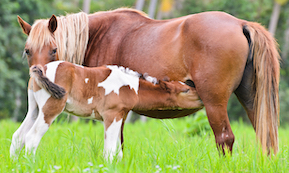How It Works
Eliminates Nightly Foal Sitting

Because FoalWatch is based on proven chemistry, you can rest easier at night. The calcium level of a mare's colostrum is known to rise sharply before birth. The FoalWatch test kit measures the concentration of calcium in the mare's colostrum and is thus able to accurately predict birth within 24 hours.
Simply begin once daily sampling and testing from 10-14 days before the mare's expected foaling date onwards, i.e. 335-340 days from her last breeding date. If the breeding date is unknown, begin when udders become enlarged.
Run FoalWatch once a day until the calcium level consistently exceeds 100 ppm. Then test the mare's colostrum twice daily, once in the morning and once in the late afternoon or evening.
When the calcium concentration consistently exceeds 200 parts per million (ppm), birth is very close. 50% of mares will foal within 24 hours after their colostrum calcium level first reaches 200 ppm. Birth usually is imminent when the mare's calcium concentration reaches 300-500 ppm. Birth within 24 hours is very rare when calcium levels are below 200 ppm. Please see the Test Instructions document on the Download page for more information.
Veterinarian Recommended
Veterinarians at leading equine medical centers have evaluated CHEMetrics FoalWatch as a foaling aid and call it ‘convenient, reliable and safe for the mare, foal, producer and veterinarian alike’.
Ley, W.B., Hoffman, J.L. et al., ‘Daytime Management of the Mare: 1: Pre-Foaling Mammary Secretions Testings, ’Journal of Equine Veterinary Science, Vol. 9, No. 2, pp. 88-89, 1989.
In his groundbreaking 1994 study The Use of a Prefoaling Milk Calcium Test Kit in the Foaling Management of Mares, Dr. Ley reported on accuracy and repeatability of FoalWatch kits while comparing them with other foaling test kits on the market.
Safe and Easy to Use

The FoalWatch test kit employs CHEMetrics patented self-filling ampoules to simplify and speed up the testing procedure. They eliminate the potential inaccuracies associated with reagent volume measurement in the field. There is no measuring or mixing of reagents required. The chemical reaction is contained within the ampoule so there is less mess and minimal post-testing clean up.
- Testing is simple and no medical or specialist training is required.
- The FoalWatch test can be run on a small colostrum sample collected from the mare, so it is non-invasive.
Extensive research has shown that the small colostrum sample volumes involved in the use of the FoalWatch test kit does not deprive the foal of any significant amount of colostrum (or its antibody content) once it is born and begins to nurse.
Please note that milking an animal manually in general may slightly increase the risk of mastitis development (infection of the mammary tissue, udder or milk), especially if the udder is not cleaned and dried prior to milking. However, if proper precautions are taken, the risk is minimal. Please see the Test Instructions document on the Download page for more information.